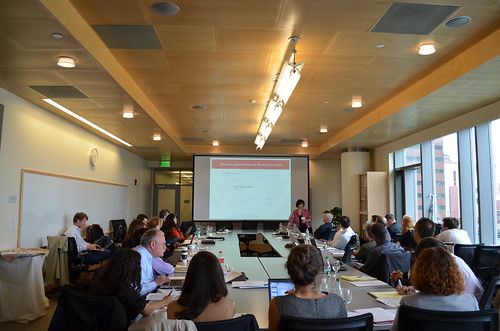The Open Economics Working Group would like to introduce the Open Economics Principles, a Statement on Openness of Economic Data and Code. A year and a half ago the Open Economics project began with a mission of becoming central point of reference and support for those interested in open economic data. In the process of identifying examples and ongoing barriers for opening up data and code for the economics profession, we saw the need to present a statement on the guiding principles of transparency and accountability in economics that would enable replication and scholarly debate as well as access to knowledge as a public good.
We wrote the Statement on the Open Economics Principles during our First and Second Open Economics International Workshops, receiving feedback from our Advisory Panel and community with the aim to emphasise the importance of having open access to data and code by default and address some of the issues around the roles of researchers, journal editors, funders and information professionals.

Read the statement below and follow this link to endorse the Principles.
Open Economics Principles
Statement on Openness of Economic Data and Code
Economic research is based on building on, reusing and openly criticising the published body of economic knowledge. Furthermore, empirical economic research and data play a central role for policy-making in many important areas of our
economies and societies.
Openness enables and underpins scholarly enquiry and debate, and is crucial in ensuring the reproducibility of economic research and analysis. Thus, for economics to function effectively, and for society to reap the full benefits from economic research, it is therefore essential that economic research results, data and analysis be openly and freely available, wherever possible.
- Open by default: by default data in its different stages and formats, program code, experimental instructions and metadata – all of the evidence used by economists to support underlying claims – should be open as per the Open Definition1, free for anyone to use, reuse and redistribute. Specifically open material should be publicly available and licensed with an appropriate open licence2.
- Privacy and confidentiality: We recognise that there are often cases where for reasons of privacy, national security and commercial confidentiality the full data cannot be made openly available. In such cases researchers should share analysis under the least restrictive terms consistent with legal requirements, abiding by the research ethics and guidelines of their community. This should include opening up non-sensitive data, summary data, metadata and code, and facilitating access if the owner of the original data grants other researchers permission to use the data
- Reward structures and data citation: recognizing the importance of data and code to the discipline, reward structures should be established in order to recognise these scholarly contributions with appropriate credit and citation in an acknowledgement that producing data and code with the documentation that make them reusable by others requires a significant commitment of time and resources. At minimum, all data necessary to understand, assess, or extend conclusions in scholarly work should be cited. Acknowledgements of research funding, traditionally limited to publications, could be extended to research data and contribution of data curators should be recognised.
- Data availability: Investigators should share their data by the time of publication of initial results of analyses of the data, except in compelling circumstances. Data relevant to public policy should be shared as quickly and widely as possible. Funders, journals and their editorial boards should put in place and enforce data availability policies requiring data, code and any other relevant information to be made openly available as soon as possible and at latest upon publication. Data should be in a machine-readable format, with well-documented instructions, and distributed through institutions that have demonstrated the capability to provide long-term stewardship and access. This will enable other researchers to replicate empirical results.
- Publicly funded data should be open: publicly funded research work that generates or uses data should ensure that the data is open, free to use, reuse and redistribute under an open licence – and specifically, it should not be kept unavailable or sold under a proprietary licence. Funding agencies and organizations disbursing public funds have a central role to play and should establish policies and mandates that support these principles, including appropriate costs for long-term data availability in the funding of research and the evaluation of such policies3, and independent funding for systematic evaluation of open data policies and use.
- Usable and discoverable: as simply making data available may not be sufficient for reusing it, data publishers and repository managers should endeavour to also make the data usable and discoverable by others; for example, documentation, the use of standard code lists, etc., all help make data more interoperable and reusable and submission of the data to standard registries and of common metadata enable greater discoverability.
See Reasons and Background and a link to endorsing the Principles: http://openeconomics.net/principles/.
2. Open licences for code are those conformant with the Open Source Definition see http://opensource.org/licenses and open licences for data should be conformant with the open definition, see http://opendefinition.org/licenses/#Data.
3. A good example of an important positive developments in this direction from the United States is http://www.whitehouse.gov/sites/default/files/microsites/ostp/ostp_public_access_memo_2013.pdf
Velichka is Project Coordinator of Open Economics at the Open Knowledge Foundation. She is based in London, a graduate of economics (Humboldt Universität zu Berlin) and environmental policy (University of Cambridge) and a fellow of the Heinrich Böll Foundation @vndimitrova










2 thoughts on “Introducing the Open Economics Principles”
Comments are closed.